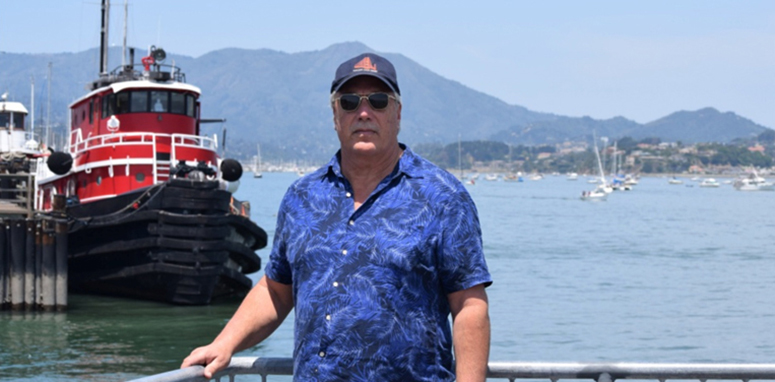From sailing in Ha Long Bay, Vietnam and on the Nile in Egypt, to outrigging in the South Pacific islands of Moorea, Aitutaki and Rarotonga, it wasn't until Carl Jeppesen sailed off of Oncho Rios, Jamaica when he looked out at the watery horizon and finally thought to himself, "I want to work on the water."

Carl Jeppesen has been a deckhand for 16 years. He prefers the freedom of the job over being confined to the wheelhouse and loves the people he meets while walking around the boat.
By Matt Larson
Published: July, 2016
From sailing in Ha Long Bay, Vietnam and on the Nile in Egypt, to outrigging in the South Pacific islands of Moorea, Aitutaki and Rarotonga, it wasn’t until Carl Jeppesen sailed off of Oncho Rios, Jamaica when he looked out at the watery horizon and finally thought to himself, “I want to work on the water.”
Fortunately, as a San Francisco native, he had the entire Bay waiting for him when he came back home. Upon his return, he joined the Inlandboatmen’s Union and hasn’t looked back. If you happen to frequent the afternoon Sausalito runs on the Golden Gate Ferry, you may very well recognize Jeppesen, who’s been a deckhand for the past 16 years.
Boating does seem to run in the Jeppesen family. His great-grandfather was a ship captain, both of his grandfathers were sailors, and his father was a boatswain first class who served during World War II. One of the ships his father served on was the USS Niblack, which picked up survivors from the USS Reuben James, a ship that had been sunk by the famous German U-Boat Commander Erich Topp.
Years later, Topp came to the United States to promote a book, and Jeppesen and his father were invited to have dinner with him. After some conversation, it turned out that Topp also had the USS Niblack—with Jeppesen’s father onboard—in his sights, but didn’t have the heart to take it down. If he did, said Jeppesen, “I wouldn’t have been here! I thought it was pretty scary to meet the man who made the decision of whether I existed or not.” Fortunately for Jeppesen, things worked out.
Jeppesen prefers being a deckhand over manning the helm. “You’re confined to the wheelhouse!” he said. “As a deckhand you can walk around the boat, you have the freedom to see everything.” And Jeppesen loves the people he meets from all over the world. Among others, he met a visitor from Denmark who ended up being his distant relative.
Sean Penn? Yeah, Jeppesen’s seen him on board a few times. Jeppsen even managed a friendly exchange with Robert De Niro. What’s more: one day, as the boat came down the estuary he noticed a helicopter above them with a tripod setup, flying around the boat. A couple years later he found out why. “I jumped off the couch when I saw the shot of the Golden Gate Ferry Spaulding coming down the estuary in a movie called True Crime with Clint Eastwood,” Jeppesen said. “I couldn’t see anybody on deck, but I was definitely on that boat.”
Despite enjoying his time on the water, life as a deckhand is just a small part of what keeps Jeppesen busy, as he’s also an accomplished jazz musician. He toured as a bass guitarist for a few years with various bands, including the Rhythm Sheiks, and he has played with local legend Lavay Smith. He also released his own solo album, Surrender, in 2010. On the album, he played both upright and electric bass and wrote all the songs. “KCSM [Jazz 91.1] gave me a bunch of airplay,” he said. “I was on the charts with John Coltrane and Branford Marsalis; that’s like making the major league baseball team as far as music.” His album is still available on both iTunes and Amazon.
Noticing the traffic getting worse over the years on the Bay Bridge also led to Jeppesen choosing a career on the water, as he’d rather be out on the Bay than commuting in traffic. “The Bay’s probably the cleanest it’s been in about 40 years. A lot of the wildlife is coming back,” Jeppesen said.
“And you never notice how nice the ferry system is until you take it. Being a native for all these years living here I’d never really ridden the ferry, but it’s a whole other world. If you’re optimistic and you try it, then you finally realize how much better it is than metal and concrete on the freeway.”

